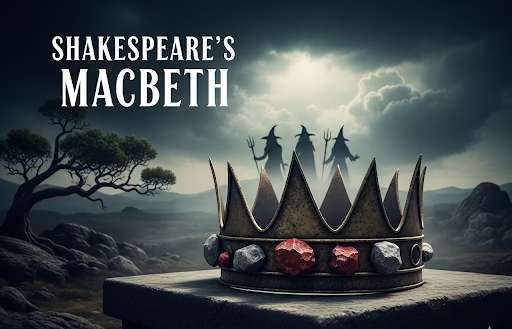Introduction
Shakespeare’s Macbeth remains a cornerstone of English literature. It exemplifies the playwright’s unparalleled skill in exploring the depths of human nature through a tragic narrative. In Shakespeare’s Macbeth, ambition, power, guilt, and the supernatural converge to create a compelling moral and psychological study. This play continues to captivate readers, scholars, and audiences centuries after its first performance. It is not merely a tale of murder and regicide; rather, it is a profound meditation on the consequences of unchecked desire, the fragility of human integrity, and the complex interplay between fate and free will. The sustained interest in Macbeth testifies to its rich themes and complex characters—an enduring masterpiece that invites continual re-examination and fresh perspectives.
Shakespeare’s Macbeth: Plot
Macbeth is a gripping tragedy centred on ambition, power, and moral disintegration. The play opens on a desolate Scottish moor where three witches deliver a chilling prophecy to Macbeth, a valorous general: he will become Thane of Cawdor and eventually King of Scotland. Shortly after, Macbeth is indeed named Thane of Cawdor, sparking his belief in the witches’ prediction of kingship.
Back at his castle, Macbeth informs his wife, Lady Macbeth, who is fiercely ambitious and immediately plans to expedite the prophecy’s fulfillment. When King Duncan arrives as a guest, Lady Macbeth persuades her hesitant husband to murder the king that very night. Macbeth kills Duncan and, in a desperate attempt to mislead suspicion, murders the king’s guards as well.
With Duncan’s death discovered, his sons Malcolm and Donalbain flee, which casts suspicion on them and clears the way for Macbeth to ascend the throne. However, plagued by paranoia and insecurity, Macbeth perceives Banquo—his friend and fellow general—as a threat because the witches prophesied Banquo’s descendants would inherit the crown. Macbeth hires assassins who kill Banquo, but his son Fleance escapes.
Macbeth’s grip on power becomes increasingly tyrannical as he returns to the witches for more prophecies. They warn him to beware Macduff, claim he cannot be harmed by anyone born of woman, and say he will remain safe until Birnam Wood moves to Dunsinane Hill. Feeling invincible, Macbeth launches violent attacks, including the slaughter of Macduff’s family.
Meanwhile, Macduff joins forces with Duncan’s son Malcolm in England to raise an army against Macbeth. Lady Macbeth, consumed by guilt, suffers from sleepwalking and a mental breakdown, ultimately dying by suicide. As Malcolm’s army advances, camouflaging themselves with branches from Birnam Wood, Macbeth’s confidence shatters. In the final battle, Macduff kills Macbeth, revealing he was born by Caesarean section, thus fulfilling the witches’ prophecy and ending Macbeth’s tyrannical reign. Malcolm is declared king, restoring order to Scotland. FULL TEXT
Shakespeare’s Macbeth: Themes
The Corrupting Power of Ambition
At the core of Macbeth lies an unrelenting exploration of ambition as a double-edged sword. Shakespeare presents ambition not merely as a universal human trait. He shows it as a force capable of profound corruption when severed from ethical boundaries. At the play’s start, Macbeth is a valorous and loyal soldier. However, after the witches prophesy his future kingship, he becomes consumed by a violent desire to ascend the Scottish throne. This fierce ambition ultimately drives his tragic downfall. This prophecy acts like a catalyst, unleashing ambition’s dark side in Macbeth’s psyche. The phrase “vaulting ambition”, from Macbeth’s own soliloquy in Act 1, Scene 7, encapsulates the reckless overleap that leads to his moral disintegration and eventual downfall.
Lady Macbeth’s character is equally essential in examining ambition’s corrosive effects. Her ruthless determination, expressed in her plea to be “unsexed” and filled with cruelty, underscores how ambition defies traditional gender roles and societal expectations. Yet, her initial iron will succumbs to the psychological torment of guilt, revealing ambition’s ultimate futility: it destroys peace of mind and human connection. This volatile mixture of ambition and power-seeking serves as a cautionary tale that resonates well beyond its historical context.
Fate versus Free Will: A Dance of Destiny and Choice
A persistent thematic tension in Macbeth is the question of fate versus free will. The witches’ prophecies infuse the narrative with an ominous sense of predestination, yet Shakespeare masterfully illuminates the role of individual agency. Macbeth’s equivocation at the beginning of the play highlights the ambiguity of his situation—he appears torn between acceptance of fate and exertion of free will.
His eventual decisions, fuelled by his interpretation of the prophecies, demonstrate how prophecy and human ambition become entwined. Macbeth is neither entirely a puppet of supernatural forces nor a purely self-determining agent; rather, Shakespeare suggests a nuanced interplay where fate may present possibilities, but human will shapes outcomes. This dynamic invites reflection on moral responsibility and the limits of determinism, themes that remain infinitely pertinent.
The Psychological Torment of Guilt and Conscience
Integral to Macbeth is the psychological descent caused by guilt and conscience. Shakespeare’s vivid depiction of guilt’s corrosive effects marks the play as a poignant study of the human mind under extreme moral strain. Macbeth experiences haunting visions that externalise his inner torment and growing paranoia. For instance, the hallucinated dagger he sees before Duncan’s murder symbolises his escalating anxiety and moral conflict. Later, the ghost of Banquo at the banquet intensifies Macbeth’s destabilising paranoia, revealing his fractured conscience and fear. These vivid hallucinations effectively dramatise the psychological consequences of guilt.
Equally compelling is Lady Macbeth’s transformation from steely manipulator to guilt-ridden sleepwalker. Her desperate attempts to scrub away invisible blood reveal the indelible stain of their crimes. This imagery symbolises that no physical act can cleanse moral culpability. Shakespeare’s portrayal highlights his profound insight into human psychology, emphasising the inevitability of conscience. It also underscores the impossibility of escaping self-judgement—an idea that resonates strongly with modern psychological understandings.
The Supernatural and the Unnatural Order
The supernatural permeates Macbeth through the figures of the witches, ghosts, and other eerie phenomena, embodying the theme of unnatural disruption. The witches, with their paradoxical maxim “Fair is foul, and foul is fair,” encapsulate the reversal of moral and natural order that underpins the tragedy. Their cryptic prophecies manipulate Macbeth and destabilise reality by blurring boundaries between appearance and truth.
Moreover, nature’s response to Duncan’s murder intensifies the play’s atmosphere of dread, manifesting as storms, unnatural animal behaviour, and daytime darkness. This cosmic disturbance mirrors the political upheaval and moral chaos unleashed by Macbeth’s transgressions. Shakespeare taps into the Renaissance belief in the Great Chain of Being, illustrating that regicide is not only a political crime but also a violation of the universe’s moral fabric.
Shakespeare’s Macbeth: Character Analysis
Macbeth: Complex Portrait of a Tragic Hero
Macbeth’s character exemplifies Shakespeare’s skill in crafting psychologically rich and morally ambiguous protagonists. He begins as a distinguished and loyal hero but slowly succumbs to ambition’s toxic lure. Scholars often debate whether Macbeth fits the classical Aristotelian tragic hero mold, which requires nobility and a tragic flaw leading to downfall. While Macbeth’s status as a thane accords him nobility, his descent into tyranny complicates traditional heroic ideals.
His soliloquies offer rare insight into his evolving mental state, revealing deep internal conflict. For example, in Act 5, Macbeth’s famous soliloquy “Tomorrow, and tomorrow, and tomorrow” reveals profound existential despair. This speech elevates him beyond a mere villain to a tragic figure grappling with the futility of his doomed existence. His character is marked by contradictions—courage intertwined with insecurity, moments of reflection overshadowed by rashness. These complexities make Macbeth a deeply human character, one who evokes both condemnation and sympathy. This rich psychological depth enhances the tragedy and sustains its relevance even in modern times.
Lady Macbeth: Ambition’s Catalyst and Tragic Victim
Lady Macbeth’s role transcends that of a simple instigator; she is a paramount figure illustrating ambition’s destructive power and guilt’s psychological devastation. Her fierce determination helps propel Macbeth toward regicide, yet she is also Shakespeare’s vehicle for exploring gender, power, and vulnerability. Her famous invocation to be “unsexed” reveals both a rejection of traditional femininity and a challenge to societal constraints.
However, her eventual psychological unravelling—manifested in guilt-induced madness and death—provides a poignant counterpoint to her earlier steely resolve. Lady Macbeth’s trajectory exemplifies the heavy toll of moral corruption, highlighting Shakespeare’s nuanced understanding of human frailty. Her character invites readers to consider the gendered dimensions of power and conscience within the play’s broader moral framework.
Banquo: The Embodiment of Morality and Loyalty
Serving as both friend and foil to Macbeth, Banquo represents steadfast loyalty and moral rectitude amid chaos. Unlike Macbeth, Banquo resists the witches’ temptations, embodying ethical restraint and cautious scepticism toward prophecy. His spectral return as a ghost contrasts with Macbeth’s psychological torment, symbolising the consequences of loyalty betrayed.
By portraying Banquo as the moral compass, Shakespeare deepens the play’s exploration of temptation, integrity, and the consequences wrought by ambition’s unchecked excess. The tension between Macbeth and Banquo enriches the dramatic stakes and underscores the corrosive effects of betrayal.
The Witches: Harbingers of Chaos and Ambiguity
The witches, also known as the “Weird Sisters,” hold a unique and unsettling position in Macbeth. They serve both as supernatural agents and symbolic embodiments of equivocation. Their cryptic pronouncements, full of ambiguity and paradox, initiate the play’s action and foreshadow the moral inversion that underlies the tragedy.
Their role invites reflection on the fragile boundaries between reality and illusion, as well as order and disorder, reinforcing an atmosphere thick with uncertainty. Furthermore, Shakespeare’s portrayal of these figures reflects early modern anxieties about witchcraft and the supernatural. This historical context adds a deeper layer of symbolic significance to their presence in the play.
Shakespeare’s Macbeth: Supernatural Elements
The supernatural elements in Macbeth are not mere theatrical decoration; rather, they embody and amplify the tragedy’s moral and psychological tensions. The witches, with their chant-like speech and mysterious presence, exaggerate the play’s eerie atmosphere and thematic ambiguity. Their prophecies fuel Macbeth’s ambition while simultaneously highlighting the dangers of interpretation and self-delusion.
Ghosts, particularly Banquo’s, haunt Macbeth’s psyche, dramatising the inescapable repercussions of guilt and betrayal. These supernatural manifestations challenge natural laws, reinforcing the motif of disorder caused by moral transgression.
This blend of the real and the unreal extends the play’s scope beyond the political and personal, suggesting cosmic consequences for earthly actions and underscoring the Renaissance belief in harmony between nature and morality. EXPLORE OTHER WORKS
Conclusion
Shakespeare’s Macbeth stands as an extraordinary achievement of literary art, psychological insight, and moral inquiry. Through its richly woven themes of ambition, fate, guilt, and supernatural influence, alongside its complex and memorable characters, the tragedy offers a piercing exploration of the human condition.
By analysing Macbeth’s layers—from its evocative language and haunting imagery to its intricate character psychology—readers gain more than an understanding of a historic play; they are invited into a timeless conversation about power and morality, justice and conscience.
This tragedy’s ability to provoke thought, evoke empathy, and disturb complacency firmly establishes it as an essential work for scholarly study and personal reflection alike. It continues to command attention, inviting interpretation and engagement across generations. In this way, Shakespeare’s Macbeth stands not only as a masterful piece of literature but also as a mirror reflecting the timeless human journey.
FAQs on Shakespeare’s Macbeth
Q1: What is the main theme of Shakespeare’s Macbeth?
The central theme of Macbeth is the destructive power of unchecked ambition. The play explores how ambition, when divorced from moral considerations, leads to corruption, guilt, and eventual downfall. Alongside ambition, themes of fate versus free will, guilt, and the supernatural also have a major impact on the narrative.
Q2: How does Shakespeare portray Macbeth’s character?
Macbeth is portrayed as a deeply conflicted tragic hero. Initially brave and honourable, his encounter with the witches awakens his ambition, leading him to make morally questionable and violent choices. His psychological complexity is revealed through soliloquies that expose his internal struggles between conscience, fear, and desire for power.
Q3: What role do the witches play in the play?
The witches symbolise chaos and moral ambiguity. Their prophecies ignite Macbeth’s ambition and manipulate him by exploiting his desires. They embody the theme of equivocation—things are not what they seem—and serve as supernatural forces that unsettle the natural order.
Q4: How does Lady Macbeth influence Macbeth?
Lady Macbeth is a driving force behind Macbeth’s early decisions, particularly in urging him to murder King Duncan. She is portrayed as ambitious and ruthless, but her strength diminishes under the weight of guilt. Her subsequent psychological downfall highlights the devastating effects of remorse.
Q5: Is Macbeth a victim of fate or his own choices?
Shakespeare presents a complex interplay between fate and free will. While the witches forecast Macbeth’s rise to power, it is his interpretation and actions that ultimately bring about his downfall. Thus, Macbeth’s fate is shaped by both external prophecy and his personal decisions.





